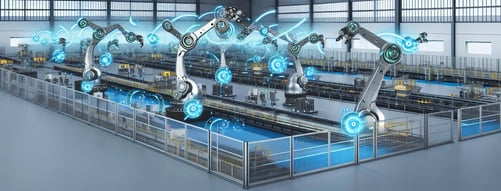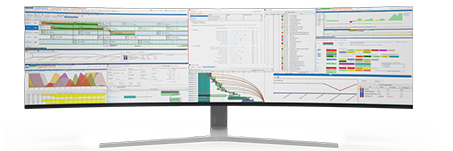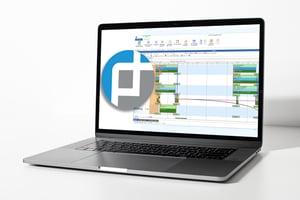Topics: Industrial Manufacturing, Resource Optimization, PlanetTogether Software, Real-Time Scheduling, Integrating PlanetTogether, End-to-End Visibility, Real-Time Data Exchange, Enables Predictive Maintenance
In industrial manufacturing, the role of robotics has become increasingly pivotal. Among the myriad of technological advancements, adaptive control in industrial robotics stands out as a game-changer, significantly enhancing the efficiency and flexibility of manufacturing processes. Supply Chain Managers, tasked with the critical responsibility of ensuring seamless operations, must now look towards sophisticated integration solutions to leverage these advancements fully.
One such solution at the forefront of this integration is PlanetTogether's advanced planning and scheduling (APS) system. When synergized with major ERP, SCM, and MES systems such as SAP, Oracle, Microsoft, Kinaxis, and Aveva, PlanetTogether transcends traditional boundaries, offering unparalleled control and adaptability in industrial robotics.
This blog aims to look into the intricacies of adaptive control in industrial robotics, highlighting the critical role of integrations between PlanetTogether and various industry-leading systems. We will explore how these integrations not only streamline operations but also pave the way for innovations that redefine the manufacturing landscape.

Adaptive control in industrial robotics refers to the capability of robotic systems to adjust their operations in real-time, responding to changes in their environment or process variables. This adaptability is crucial in modern manufacturing, where demand variability and production flexibility are key. Adaptive control systems use algorithms and sensors to constantly collect data and adjust robotic movements and operations accordingly, ensuring optimal performance.
The integration of adaptive control in industrial robotics offers numerous benefits:
Enhanced Flexibility: Easily adapt to new products, changes in design, or process modifications.
Increased Efficiency and Productivity: Optimize operations and reduce downtime.
Improved Quality: Consistent and precise operations reduce errors and waste.
Cost Savings: Greater efficiency leads to reduced operational costs.
![]()

PlanetTogether's APS is a dynamic, scalable solution designed to optimize manufacturing schedules and resources. Its real-time planning and scheduling capabilities enable manufacturers to respond swiftly to changes, enhancing their agility.
When integrated with robotic systems, PlanetTogether's APS brings several advantages:
Real-time Scheduling: Aligns robotic operations with production schedules for maximum efficiency.
Resource Optimization: Ensures optimal use of robotic capabilities in conjunction with human resources.
Predictive Maintenance: Schedules maintenance tasks for robots, avoiding unplanned downtime.

The integration of PlanetTogether's APS with various ERP systems is a cornerstone of achieving adaptive control in industrial robotics. Each ERP system offers unique features and benefits when integrated with PlanetTogether:
Real-time Data Exchange: Seamless flow of information between SAP and PlanetTogether ensures that production schedules are always up-to-date.
Enhanced Visibility: Provides comprehensive visibility into production operations, allowing for more informed decision-making.
Advanced Analytics: Leverages Oracle's robust analytics for predictive scheduling and maintenance.
Scalability: Suits businesses of all sizes, adapting to the growing needs of industrial manufacturing.
Familiar Interface: Easy adoption due to the familiar Microsoft environment.
Cloud Integration: Leverages Microsoft's cloud solutions for enhanced data security and accessibility.
RapidResponse® Technology: Offers quick adaptation to changes in demand or supply chain disruptions.
End-to-End Visibility: Ensures a comprehensive view of the supply chain, enhancing adaptive control capabilities.
Industrial IoT Integration: Harnesses the power of IoT for real-time monitoring and control.
Advanced Simulation: Enables simulation of production processes for optimal robotic control.
The future of adaptive control in industrial robotics and system integration is likely to be influenced by several emerging trends:
AI and Machine Learning: Enhanced predictive capabilities in scheduling and maintenance.
5G Technology: Faster and more reliable data transfer, enabling real-time control and monitoring.
Blockchain in Supply Chain: Improved transparency and security in supply chain operations.
Adaptive control in industrial robotics, enhanced through the integration of PlanetTogether with ERP systems like SAP, Oracle, Microsoft, Kinaxis, and Aveva, is more than a technological advancement; it's a strategic imperative in modern industrial manufacturing. As we move forward, the convergence of technologies like AI, IoT, and 5G will further revolutionize this field.
For Supply Chain Managers, staying ahead means embracing these integrations, continuously adapting, and innovating to meet the ever-evolving demands of the industry.
Topics: Industrial Manufacturing, Resource Optimization, PlanetTogether Software, Real-Time Scheduling, Integrating PlanetTogether, End-to-End Visibility, Real-Time Data Exchange, Enables Predictive Maintenance
0 Comments
No video selected
Select a video type in the sidebar.







LEAVE A COMMENT